Organizational Behaviour: Motivation and Competitive Advantage
VerifiedAdded on 2022/12/28
|9
|2612
|100
Report
AI Summary
This report delves into the realm of organizational behaviour, examining its significance in the modern business landscape and its impact on employee motivation. It explores the various factors that drive motivation, such as rewards, recognition, development opportunities, a healthy work environment, leadership, and work-life balance. The report highlights how a motivated workforce can provide a competitive advantage, leading to increased productivity, effectiveness, and innovation. It also uses Tesco PLC as a case study, analyzing the company's practices in fostering employee motivation. These practices include recognizing employee efforts, providing clear objectives, and ensuring job security. The report concludes by emphasizing the crucial role of organizational behaviour in achieving company success, attracting customers, and maintaining a competitive edge.
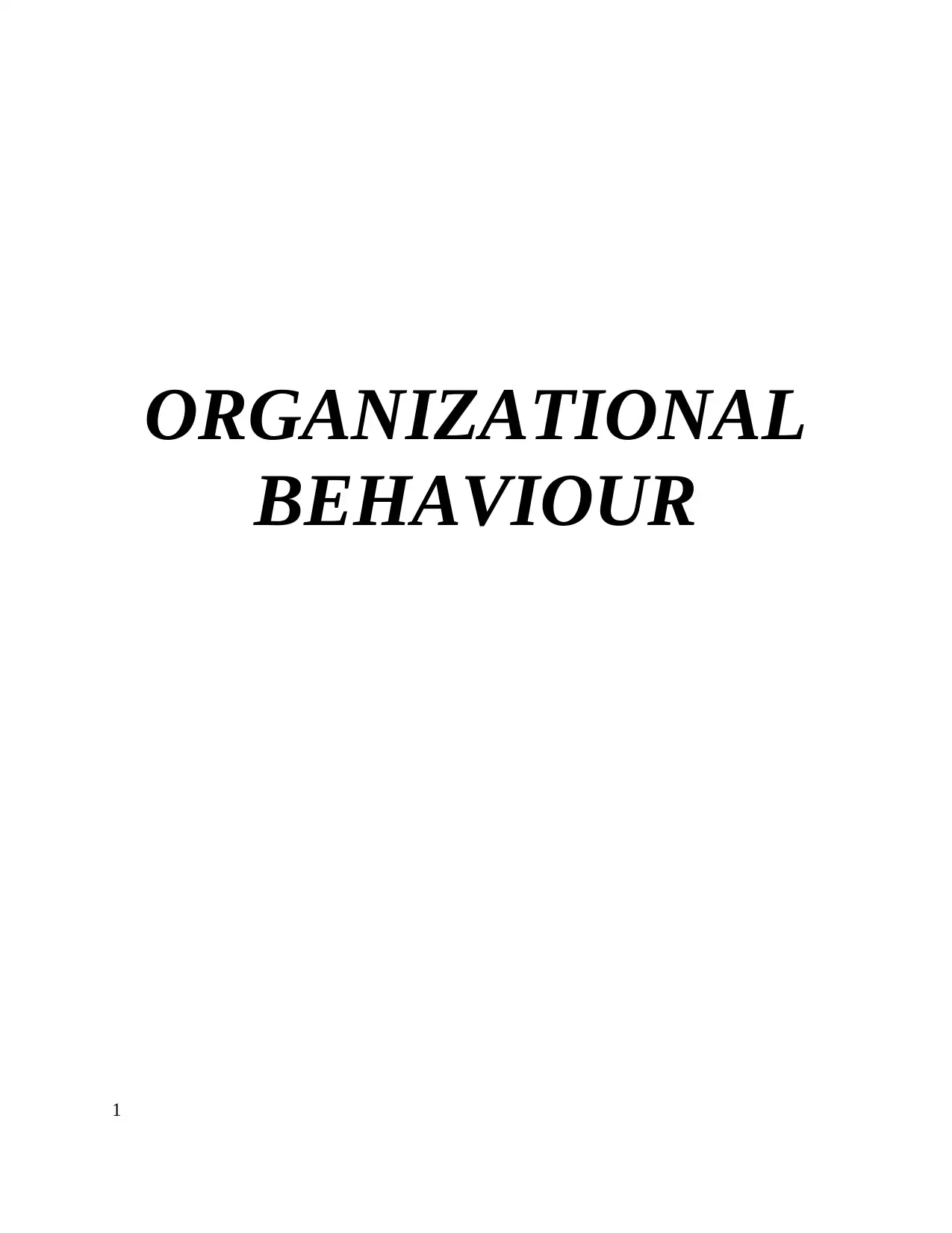
ORGANIZATIONAL
BEHAVIOUR
1
BEHAVIOUR
1
Paraphrase This Document
Need a fresh take? Get an instant paraphrase of this document with our AI Paraphraser
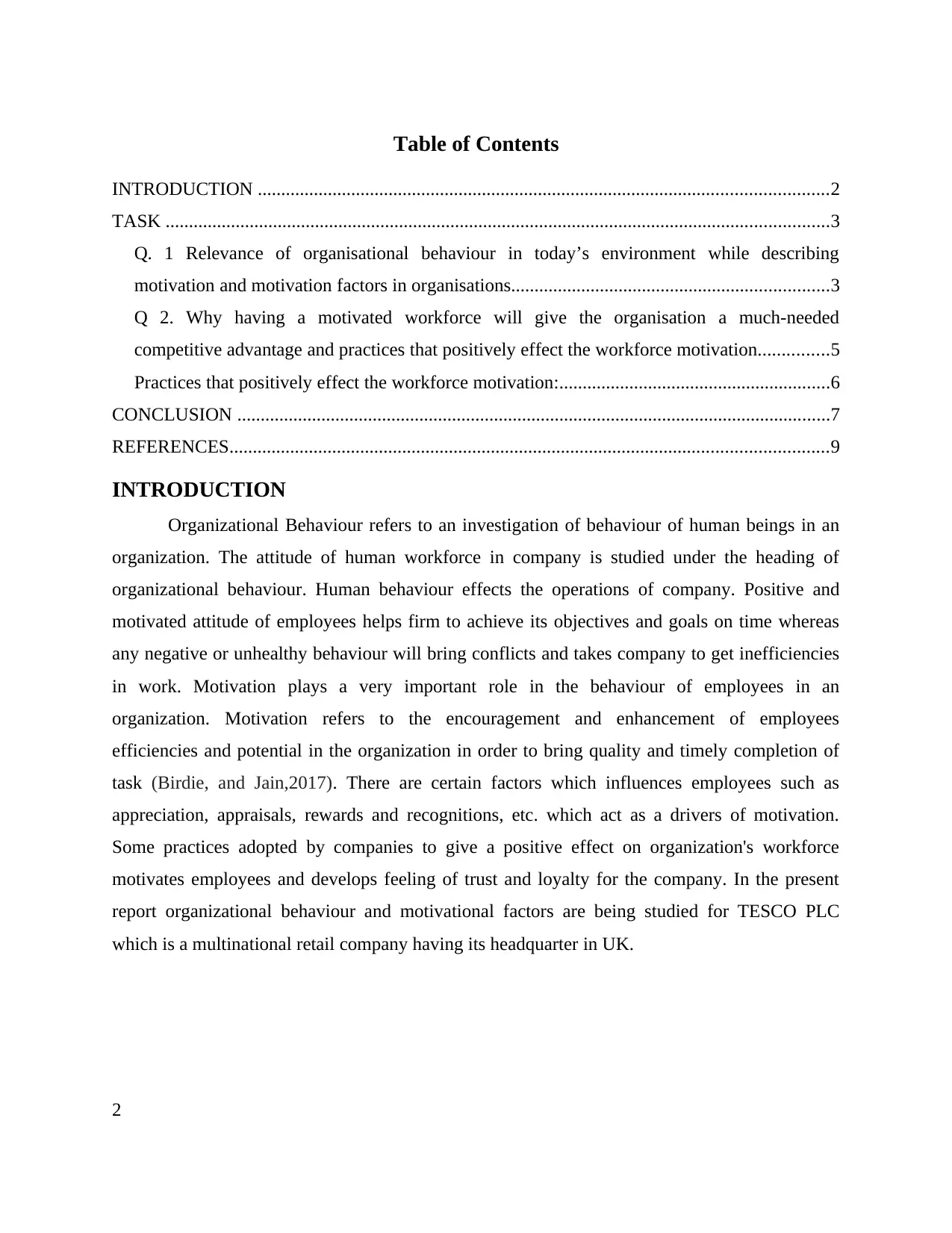
Table of Contents
INTRODUCTION ..........................................................................................................................2
TASK ..............................................................................................................................................3
Q. 1 Relevance of organisational behaviour in today’s environment while describing
motivation and motivation factors in organisations....................................................................3
Q 2. Why having a motivated workforce will give the organisation a much-needed
competitive advantage and practices that positively effect the workforce motivation...............5
Practices that positively effect the workforce motivation:..........................................................6
CONCLUSION ...............................................................................................................................7
REFERENCES................................................................................................................................9
INTRODUCTION
Organizational Behaviour refers to an investigation of behaviour of human beings in an
organization. The attitude of human workforce in company is studied under the heading of
organizational behaviour. Human behaviour effects the operations of company. Positive and
motivated attitude of employees helps firm to achieve its objectives and goals on time whereas
any negative or unhealthy behaviour will bring conflicts and takes company to get inefficiencies
in work. Motivation plays a very important role in the behaviour of employees in an
organization. Motivation refers to the encouragement and enhancement of employees
efficiencies and potential in the organization in order to bring quality and timely completion of
task (Birdie, and Jain,2017). There are certain factors which influences employees such as
appreciation, appraisals, rewards and recognitions, etc. which act as a drivers of motivation.
Some practices adopted by companies to give a positive effect on organization's workforce
motivates employees and develops feeling of trust and loyalty for the company. In the present
report organizational behaviour and motivational factors are being studied for TESCO PLC
which is a multinational retail company having its headquarter in UK.
2
INTRODUCTION ..........................................................................................................................2
TASK ..............................................................................................................................................3
Q. 1 Relevance of organisational behaviour in today’s environment while describing
motivation and motivation factors in organisations....................................................................3
Q 2. Why having a motivated workforce will give the organisation a much-needed
competitive advantage and practices that positively effect the workforce motivation...............5
Practices that positively effect the workforce motivation:..........................................................6
CONCLUSION ...............................................................................................................................7
REFERENCES................................................................................................................................9
INTRODUCTION
Organizational Behaviour refers to an investigation of behaviour of human beings in an
organization. The attitude of human workforce in company is studied under the heading of
organizational behaviour. Human behaviour effects the operations of company. Positive and
motivated attitude of employees helps firm to achieve its objectives and goals on time whereas
any negative or unhealthy behaviour will bring conflicts and takes company to get inefficiencies
in work. Motivation plays a very important role in the behaviour of employees in an
organization. Motivation refers to the encouragement and enhancement of employees
efficiencies and potential in the organization in order to bring quality and timely completion of
task (Birdie, and Jain,2017). There are certain factors which influences employees such as
appreciation, appraisals, rewards and recognitions, etc. which act as a drivers of motivation.
Some practices adopted by companies to give a positive effect on organization's workforce
motivates employees and develops feeling of trust and loyalty for the company. In the present
report organizational behaviour and motivational factors are being studied for TESCO PLC
which is a multinational retail company having its headquarter in UK.
2
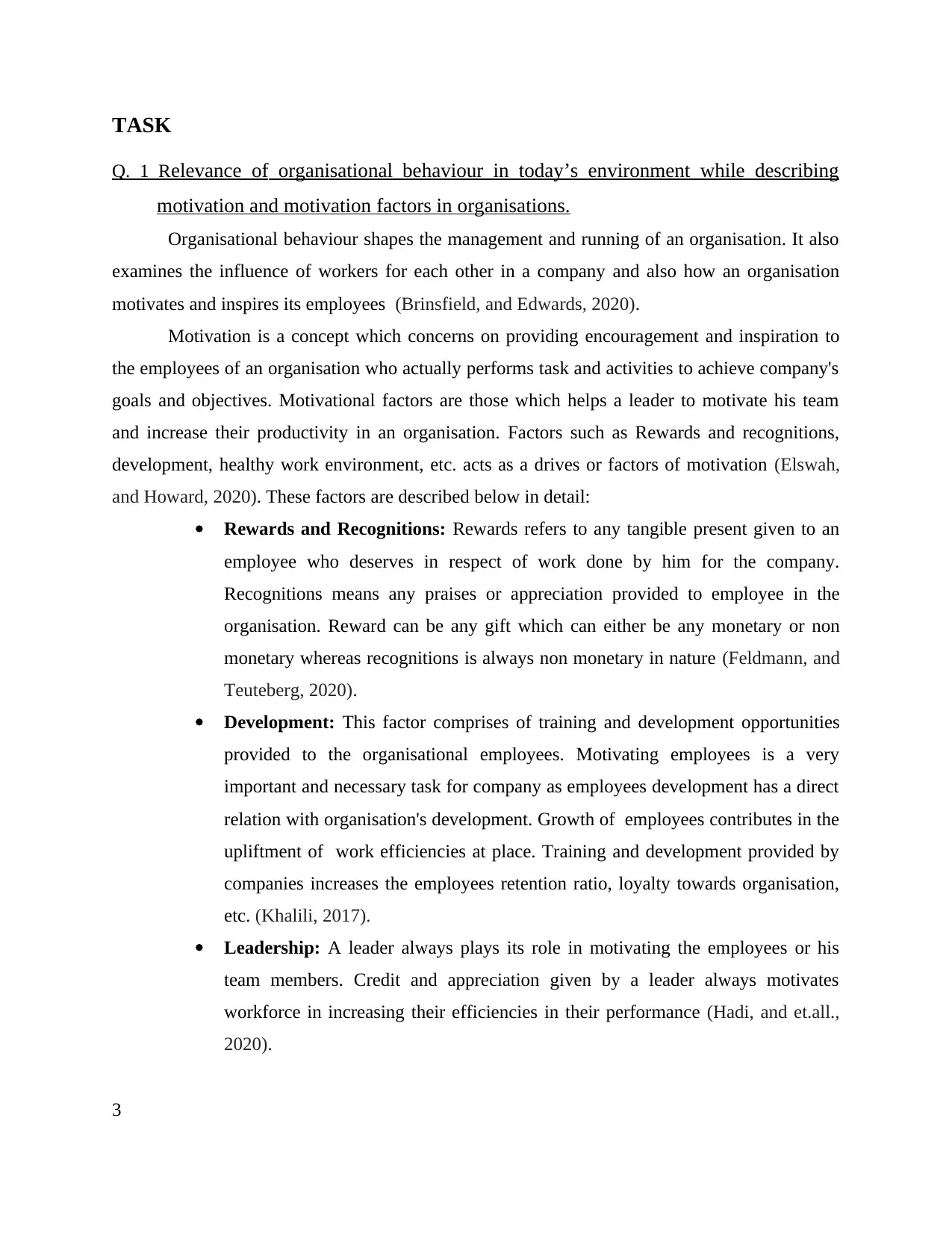
TASK
Q. 1 Relevance of organisational behaviour in today’s environment while describing
motivation and motivation factors in organisations.
Organisational behaviour shapes the management and running of an organisation. It also
examines the influence of workers for each other in a company and also how an organisation
motivates and inspires its employees (Brinsfield, and Edwards, 2020).
Motivation is a concept which concerns on providing encouragement and inspiration to
the employees of an organisation who actually performs task and activities to achieve company's
goals and objectives. Motivational factors are those which helps a leader to motivate his team
and increase their productivity in an organisation. Factors such as Rewards and recognitions,
development, healthy work environment, etc. acts as a drives or factors of motivation (Elswah,
and Howard, 2020). These factors are described below in detail:
Rewards and Recognitions: Rewards refers to any tangible present given to an
employee who deserves in respect of work done by him for the company.
Recognitions means any praises or appreciation provided to employee in the
organisation. Reward can be any gift which can either be any monetary or non
monetary whereas recognitions is always non monetary in nature (Feldmann, and
Teuteberg, 2020).
Development: This factor comprises of training and development opportunities
provided to the organisational employees. Motivating employees is a very
important and necessary task for company as employees development has a direct
relation with organisation's development. Growth of employees contributes in the
upliftment of work efficiencies at place. Training and development provided by
companies increases the employees retention ratio, loyalty towards organisation,
etc. (Khalili, 2017).
Leadership: A leader always plays its role in motivating the employees or his
team members. Credit and appreciation given by a leader always motivates
workforce in increasing their efficiencies in their performance (Hadi, and et.all.,
2020).
3
Q. 1 Relevance of organisational behaviour in today’s environment while describing
motivation and motivation factors in organisations.
Organisational behaviour shapes the management and running of an organisation. It also
examines the influence of workers for each other in a company and also how an organisation
motivates and inspires its employees (Brinsfield, and Edwards, 2020).
Motivation is a concept which concerns on providing encouragement and inspiration to
the employees of an organisation who actually performs task and activities to achieve company's
goals and objectives. Motivational factors are those which helps a leader to motivate his team
and increase their productivity in an organisation. Factors such as Rewards and recognitions,
development, healthy work environment, etc. acts as a drives or factors of motivation (Elswah,
and Howard, 2020). These factors are described below in detail:
Rewards and Recognitions: Rewards refers to any tangible present given to an
employee who deserves in respect of work done by him for the company.
Recognitions means any praises or appreciation provided to employee in the
organisation. Reward can be any gift which can either be any monetary or non
monetary whereas recognitions is always non monetary in nature (Feldmann, and
Teuteberg, 2020).
Development: This factor comprises of training and development opportunities
provided to the organisational employees. Motivating employees is a very
important and necessary task for company as employees development has a direct
relation with organisation's development. Growth of employees contributes in the
upliftment of work efficiencies at place. Training and development provided by
companies increases the employees retention ratio, loyalty towards organisation,
etc. (Khalili, 2017).
Leadership: A leader always plays its role in motivating the employees or his
team members. Credit and appreciation given by a leader always motivates
workforce in increasing their efficiencies in their performance (Hadi, and et.all.,
2020).
3
⊘ This is a preview!⊘
Do you want full access?
Subscribe today to unlock all pages.

Trusted by 1+ million students worldwide
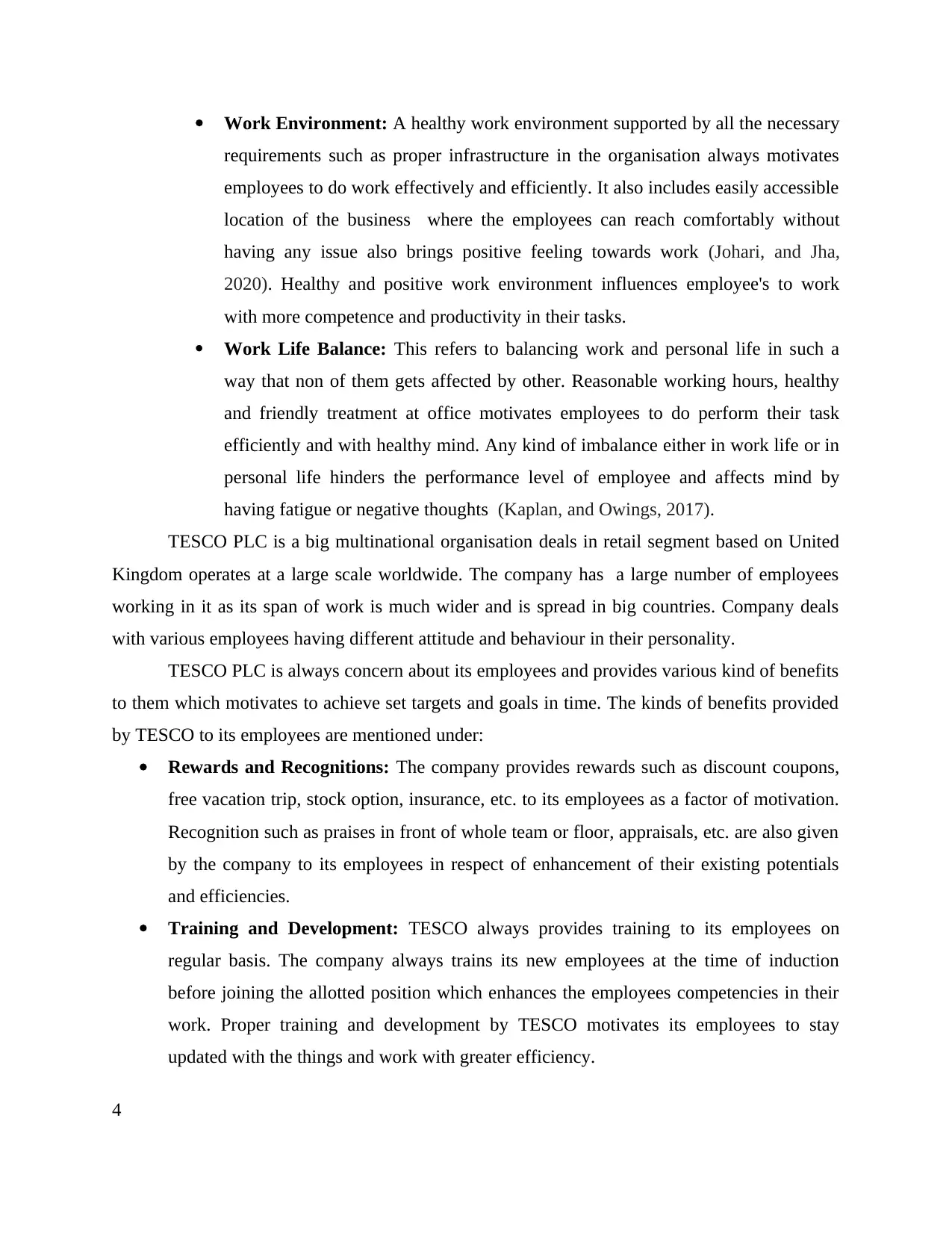
Work Environment: A healthy work environment supported by all the necessary
requirements such as proper infrastructure in the organisation always motivates
employees to do work effectively and efficiently. It also includes easily accessible
location of the business where the employees can reach comfortably without
having any issue also brings positive feeling towards work (Johari, and Jha,
2020). Healthy and positive work environment influences employee's to work
with more competence and productivity in their tasks.
Work Life Balance: This refers to balancing work and personal life in such a
way that non of them gets affected by other. Reasonable working hours, healthy
and friendly treatment at office motivates employees to do perform their task
efficiently and with healthy mind. Any kind of imbalance either in work life or in
personal life hinders the performance level of employee and affects mind by
having fatigue or negative thoughts (Kaplan, and Owings, 2017).
TESCO PLC is a big multinational organisation deals in retail segment based on United
Kingdom operates at a large scale worldwide. The company has a large number of employees
working in it as its span of work is much wider and is spread in big countries. Company deals
with various employees having different attitude and behaviour in their personality.
TESCO PLC is always concern about its employees and provides various kind of benefits
to them which motivates to achieve set targets and goals in time. The kinds of benefits provided
by TESCO to its employees are mentioned under:
Rewards and Recognitions: The company provides rewards such as discount coupons,
free vacation trip, stock option, insurance, etc. to its employees as a factor of motivation.
Recognition such as praises in front of whole team or floor, appraisals, etc. are also given
by the company to its employees in respect of enhancement of their existing potentials
and efficiencies.
Training and Development: TESCO always provides training to its employees on
regular basis. The company always trains its new employees at the time of induction
before joining the allotted position which enhances the employees competencies in their
work. Proper training and development by TESCO motivates its employees to stay
updated with the things and work with greater efficiency.
4
requirements such as proper infrastructure in the organisation always motivates
employees to do work effectively and efficiently. It also includes easily accessible
location of the business where the employees can reach comfortably without
having any issue also brings positive feeling towards work (Johari, and Jha,
2020). Healthy and positive work environment influences employee's to work
with more competence and productivity in their tasks.
Work Life Balance: This refers to balancing work and personal life in such a
way that non of them gets affected by other. Reasonable working hours, healthy
and friendly treatment at office motivates employees to do perform their task
efficiently and with healthy mind. Any kind of imbalance either in work life or in
personal life hinders the performance level of employee and affects mind by
having fatigue or negative thoughts (Kaplan, and Owings, 2017).
TESCO PLC is a big multinational organisation deals in retail segment based on United
Kingdom operates at a large scale worldwide. The company has a large number of employees
working in it as its span of work is much wider and is spread in big countries. Company deals
with various employees having different attitude and behaviour in their personality.
TESCO PLC is always concern about its employees and provides various kind of benefits
to them which motivates to achieve set targets and goals in time. The kinds of benefits provided
by TESCO to its employees are mentioned under:
Rewards and Recognitions: The company provides rewards such as discount coupons,
free vacation trip, stock option, insurance, etc. to its employees as a factor of motivation.
Recognition such as praises in front of whole team or floor, appraisals, etc. are also given
by the company to its employees in respect of enhancement of their existing potentials
and efficiencies.
Training and Development: TESCO always provides training to its employees on
regular basis. The company always trains its new employees at the time of induction
before joining the allotted position which enhances the employees competencies in their
work. Proper training and development by TESCO motivates its employees to stay
updated with the things and work with greater efficiency.
4
Paraphrase This Document
Need a fresh take? Get an instant paraphrase of this document with our AI Paraphraser
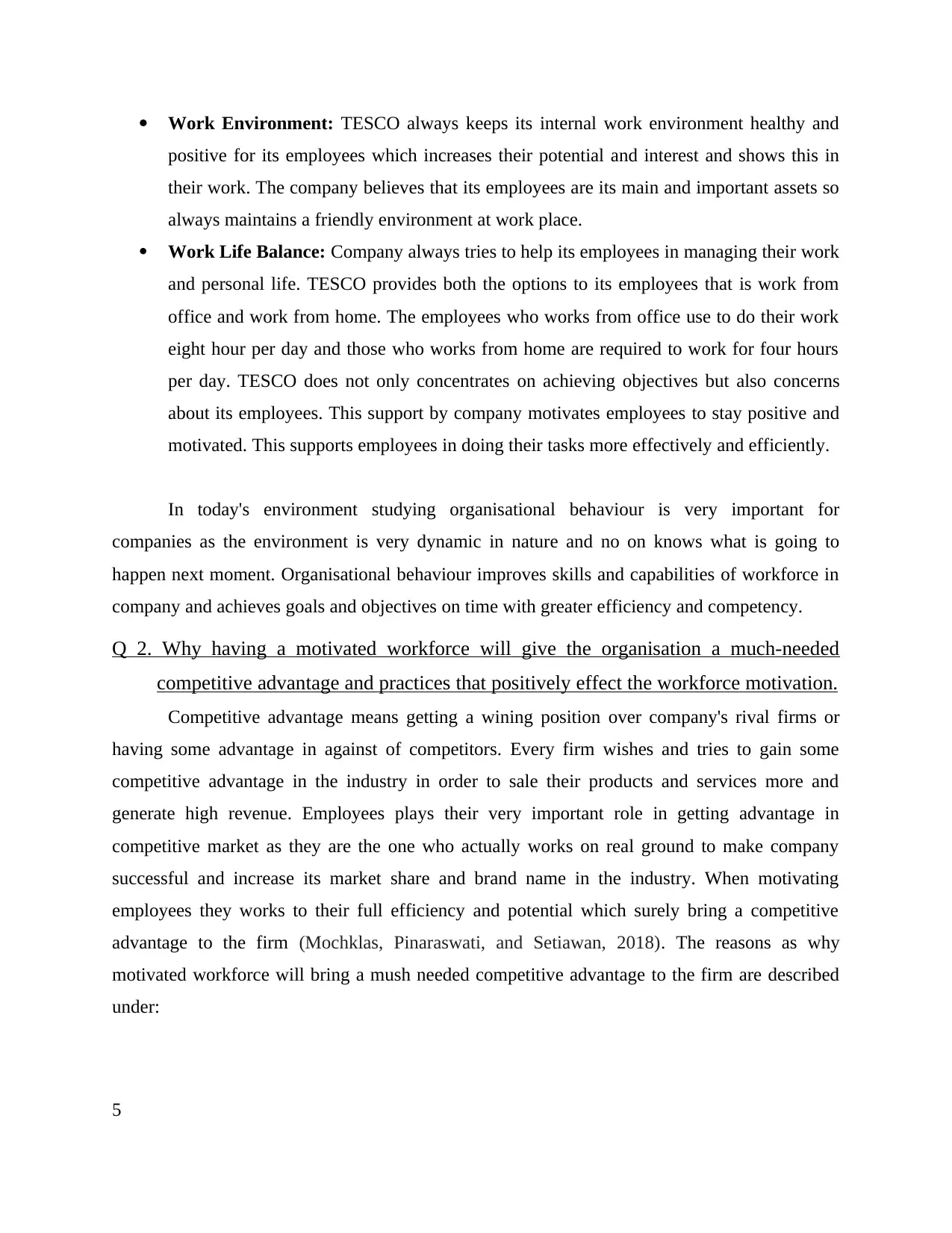
Work Environment: TESCO always keeps its internal work environment healthy and
positive for its employees which increases their potential and interest and shows this in
their work. The company believes that its employees are its main and important assets so
always maintains a friendly environment at work place.
Work Life Balance: Company always tries to help its employees in managing their work
and personal life. TESCO provides both the options to its employees that is work from
office and work from home. The employees who works from office use to do their work
eight hour per day and those who works from home are required to work for four hours
per day. TESCO does not only concentrates on achieving objectives but also concerns
about its employees. This support by company motivates employees to stay positive and
motivated. This supports employees in doing their tasks more effectively and efficiently.
In today's environment studying organisational behaviour is very important for
companies as the environment is very dynamic in nature and no on knows what is going to
happen next moment. Organisational behaviour improves skills and capabilities of workforce in
company and achieves goals and objectives on time with greater efficiency and competency.
Q 2. Why having a motivated workforce will give the organisation a much-needed
competitive advantage and practices that positively effect the workforce motivation.
Competitive advantage means getting a wining position over company's rival firms or
having some advantage in against of competitors. Every firm wishes and tries to gain some
competitive advantage in the industry in order to sale their products and services more and
generate high revenue. Employees plays their very important role in getting advantage in
competitive market as they are the one who actually works on real ground to make company
successful and increase its market share and brand name in the industry. When motivating
employees they works to their full efficiency and potential which surely bring a competitive
advantage to the firm (Mochklas, Pinaraswati, and Setiawan, 2018). The reasons as why
motivated workforce will bring a mush needed competitive advantage to the firm are described
under:
5
positive for its employees which increases their potential and interest and shows this in
their work. The company believes that its employees are its main and important assets so
always maintains a friendly environment at work place.
Work Life Balance: Company always tries to help its employees in managing their work
and personal life. TESCO provides both the options to its employees that is work from
office and work from home. The employees who works from office use to do their work
eight hour per day and those who works from home are required to work for four hours
per day. TESCO does not only concentrates on achieving objectives but also concerns
about its employees. This support by company motivates employees to stay positive and
motivated. This supports employees in doing their tasks more effectively and efficiently.
In today's environment studying organisational behaviour is very important for
companies as the environment is very dynamic in nature and no on knows what is going to
happen next moment. Organisational behaviour improves skills and capabilities of workforce in
company and achieves goals and objectives on time with greater efficiency and competency.
Q 2. Why having a motivated workforce will give the organisation a much-needed
competitive advantage and practices that positively effect the workforce motivation.
Competitive advantage means getting a wining position over company's rival firms or
having some advantage in against of competitors. Every firm wishes and tries to gain some
competitive advantage in the industry in order to sale their products and services more and
generate high revenue. Employees plays their very important role in getting advantage in
competitive market as they are the one who actually works on real ground to make company
successful and increase its market share and brand name in the industry. When motivating
employees they works to their full efficiency and potential which surely bring a competitive
advantage to the firm (Mochklas, Pinaraswati, and Setiawan, 2018). The reasons as why
motivated workforce will bring a mush needed competitive advantage to the firm are described
under:
5
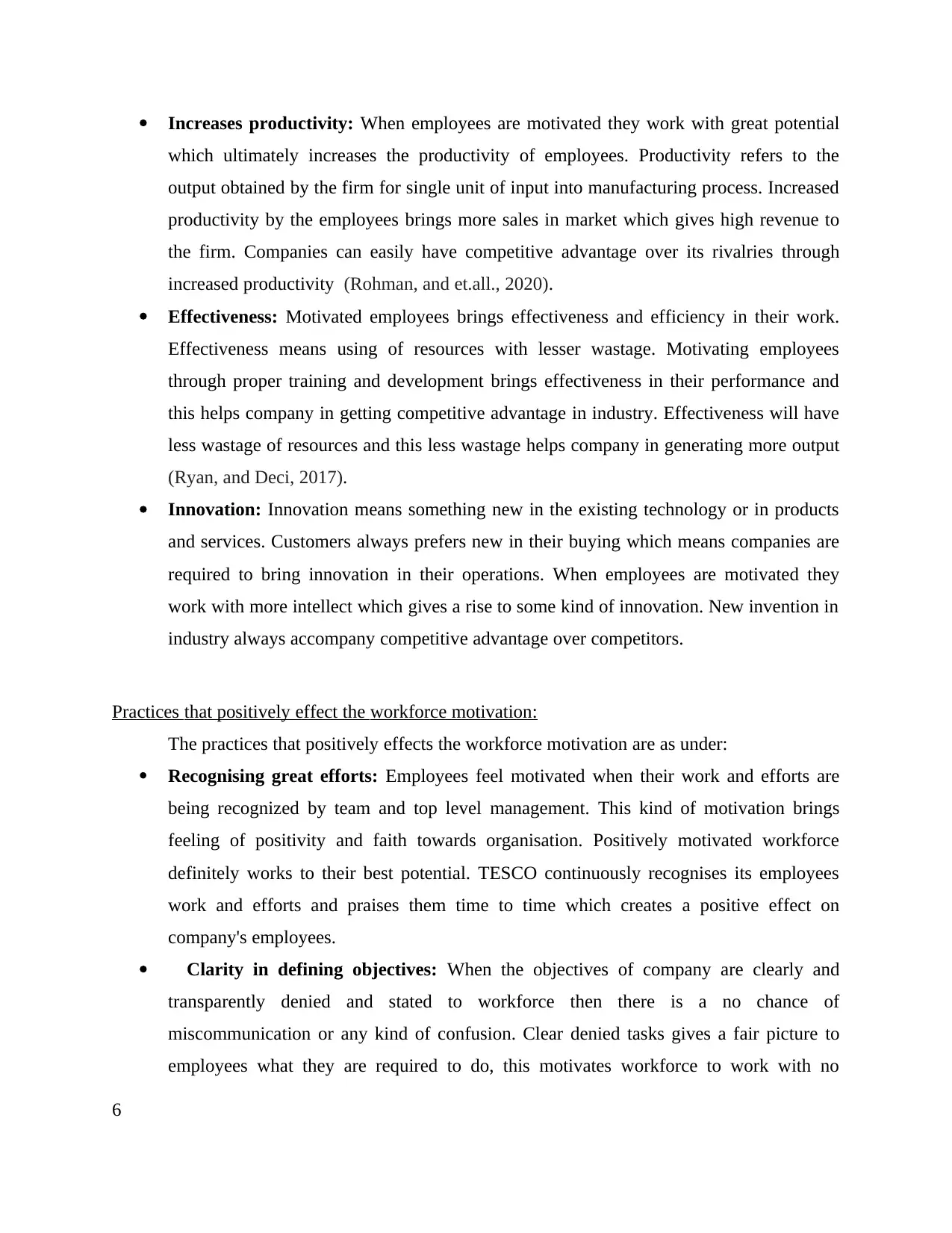
Increases productivity: When employees are motivated they work with great potential
which ultimately increases the productivity of employees. Productivity refers to the
output obtained by the firm for single unit of input into manufacturing process. Increased
productivity by the employees brings more sales in market which gives high revenue to
the firm. Companies can easily have competitive advantage over its rivalries through
increased productivity (Rohman, and et.all., 2020).
Effectiveness: Motivated employees brings effectiveness and efficiency in their work.
Effectiveness means using of resources with lesser wastage. Motivating employees
through proper training and development brings effectiveness in their performance and
this helps company in getting competitive advantage in industry. Effectiveness will have
less wastage of resources and this less wastage helps company in generating more output
(Ryan, and Deci, 2017).
Innovation: Innovation means something new in the existing technology or in products
and services. Customers always prefers new in their buying which means companies are
required to bring innovation in their operations. When employees are motivated they
work with more intellect which gives a rise to some kind of innovation. New invention in
industry always accompany competitive advantage over competitors.
Practices that positively effect the workforce motivation:
The practices that positively effects the workforce motivation are as under:
Recognising great efforts: Employees feel motivated when their work and efforts are
being recognized by team and top level management. This kind of motivation brings
feeling of positivity and faith towards organisation. Positively motivated workforce
definitely works to their best potential. TESCO continuously recognises its employees
work and efforts and praises them time to time which creates a positive effect on
company's employees.
Clarity in defining objectives: When the objectives of company are clearly and
transparently denied and stated to workforce then there is a no chance of
miscommunication or any kind of confusion. Clear denied tasks gives a fair picture to
employees what they are required to do, this motivates workforce to work with no
6
which ultimately increases the productivity of employees. Productivity refers to the
output obtained by the firm for single unit of input into manufacturing process. Increased
productivity by the employees brings more sales in market which gives high revenue to
the firm. Companies can easily have competitive advantage over its rivalries through
increased productivity (Rohman, and et.all., 2020).
Effectiveness: Motivated employees brings effectiveness and efficiency in their work.
Effectiveness means using of resources with lesser wastage. Motivating employees
through proper training and development brings effectiveness in their performance and
this helps company in getting competitive advantage in industry. Effectiveness will have
less wastage of resources and this less wastage helps company in generating more output
(Ryan, and Deci, 2017).
Innovation: Innovation means something new in the existing technology or in products
and services. Customers always prefers new in their buying which means companies are
required to bring innovation in their operations. When employees are motivated they
work with more intellect which gives a rise to some kind of innovation. New invention in
industry always accompany competitive advantage over competitors.
Practices that positively effect the workforce motivation:
The practices that positively effects the workforce motivation are as under:
Recognising great efforts: Employees feel motivated when their work and efforts are
being recognized by team and top level management. This kind of motivation brings
feeling of positivity and faith towards organisation. Positively motivated workforce
definitely works to their best potential. TESCO continuously recognises its employees
work and efforts and praises them time to time which creates a positive effect on
company's employees.
Clarity in defining objectives: When the objectives of company are clearly and
transparently denied and stated to workforce then there is a no chance of
miscommunication or any kind of confusion. Clear denied tasks gives a fair picture to
employees what they are required to do, this motivates workforce to work with no
6
⊘ This is a preview!⊘
Do you want full access?
Subscribe today to unlock all pages.

Trusted by 1+ million students worldwide
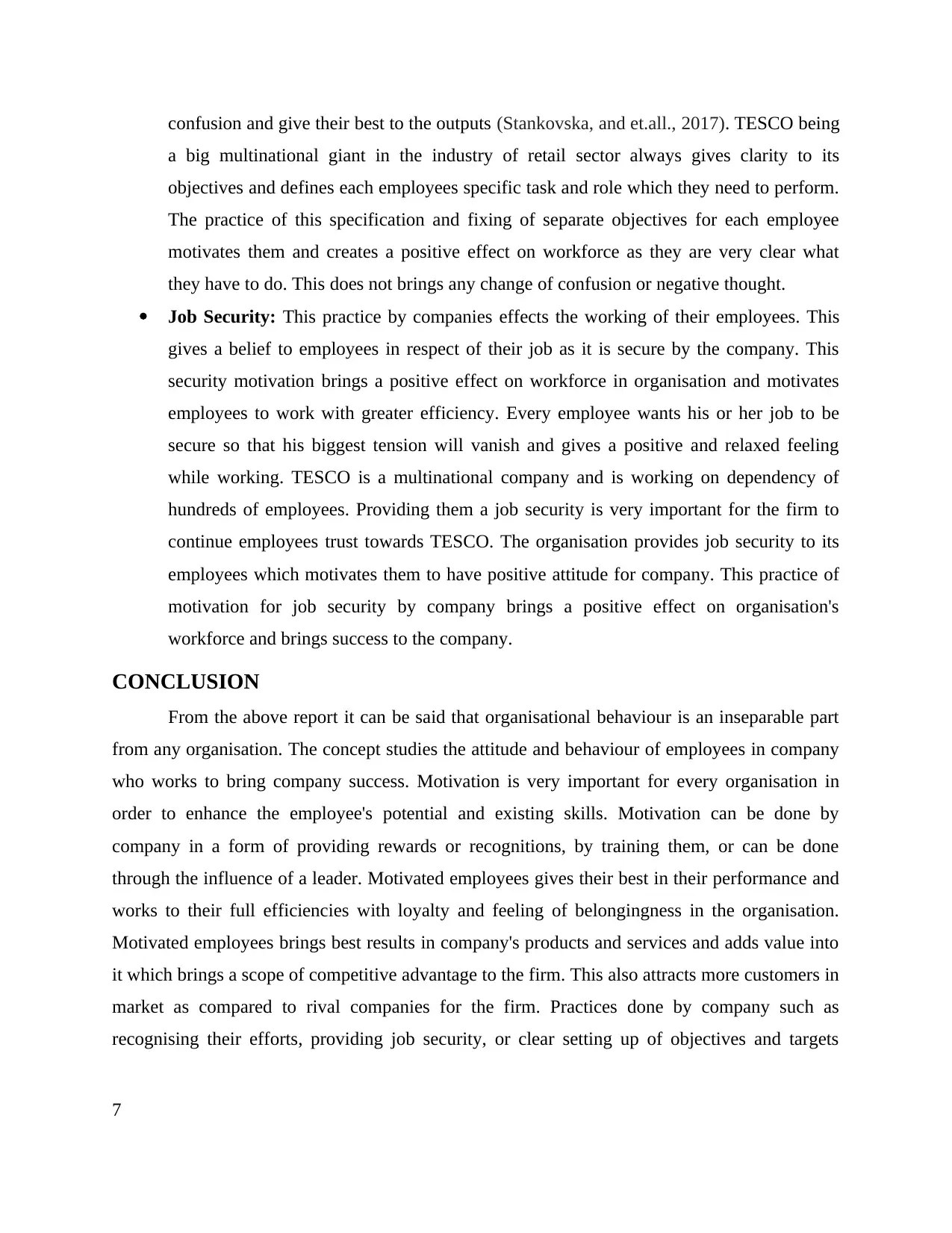
confusion and give their best to the outputs (Stankovska, and et.all., 2017). TESCO being
a big multinational giant in the industry of retail sector always gives clarity to its
objectives and defines each employees specific task and role which they need to perform.
The practice of this specification and fixing of separate objectives for each employee
motivates them and creates a positive effect on workforce as they are very clear what
they have to do. This does not brings any change of confusion or negative thought.
Job Security: This practice by companies effects the working of their employees. This
gives a belief to employees in respect of their job as it is secure by the company. This
security motivation brings a positive effect on workforce in organisation and motivates
employees to work with greater efficiency. Every employee wants his or her job to be
secure so that his biggest tension will vanish and gives a positive and relaxed feeling
while working. TESCO is a multinational company and is working on dependency of
hundreds of employees. Providing them a job security is very important for the firm to
continue employees trust towards TESCO. The organisation provides job security to its
employees which motivates them to have positive attitude for company. This practice of
motivation for job security by company brings a positive effect on organisation's
workforce and brings success to the company.
CONCLUSION
From the above report it can be said that organisational behaviour is an inseparable part
from any organisation. The concept studies the attitude and behaviour of employees in company
who works to bring company success. Motivation is very important for every organisation in
order to enhance the employee's potential and existing skills. Motivation can be done by
company in a form of providing rewards or recognitions, by training them, or can be done
through the influence of a leader. Motivated employees gives their best in their performance and
works to their full efficiencies with loyalty and feeling of belongingness in the organisation.
Motivated employees brings best results in company's products and services and adds value into
it which brings a scope of competitive advantage to the firm. This also attracts more customers in
market as compared to rival companies for the firm. Practices done by company such as
recognising their efforts, providing job security, or clear setting up of objectives and targets
7
a big multinational giant in the industry of retail sector always gives clarity to its
objectives and defines each employees specific task and role which they need to perform.
The practice of this specification and fixing of separate objectives for each employee
motivates them and creates a positive effect on workforce as they are very clear what
they have to do. This does not brings any change of confusion or negative thought.
Job Security: This practice by companies effects the working of their employees. This
gives a belief to employees in respect of their job as it is secure by the company. This
security motivation brings a positive effect on workforce in organisation and motivates
employees to work with greater efficiency. Every employee wants his or her job to be
secure so that his biggest tension will vanish and gives a positive and relaxed feeling
while working. TESCO is a multinational company and is working on dependency of
hundreds of employees. Providing them a job security is very important for the firm to
continue employees trust towards TESCO. The organisation provides job security to its
employees which motivates them to have positive attitude for company. This practice of
motivation for job security by company brings a positive effect on organisation's
workforce and brings success to the company.
CONCLUSION
From the above report it can be said that organisational behaviour is an inseparable part
from any organisation. The concept studies the attitude and behaviour of employees in company
who works to bring company success. Motivation is very important for every organisation in
order to enhance the employee's potential and existing skills. Motivation can be done by
company in a form of providing rewards or recognitions, by training them, or can be done
through the influence of a leader. Motivated employees gives their best in their performance and
works to their full efficiencies with loyalty and feeling of belongingness in the organisation.
Motivated employees brings best results in company's products and services and adds value into
it which brings a scope of competitive advantage to the firm. This also attracts more customers in
market as compared to rival companies for the firm. Practices done by company such as
recognising their efforts, providing job security, or clear setting up of objectives and targets
7
Paraphrase This Document
Need a fresh take? Get an instant paraphrase of this document with our AI Paraphraser
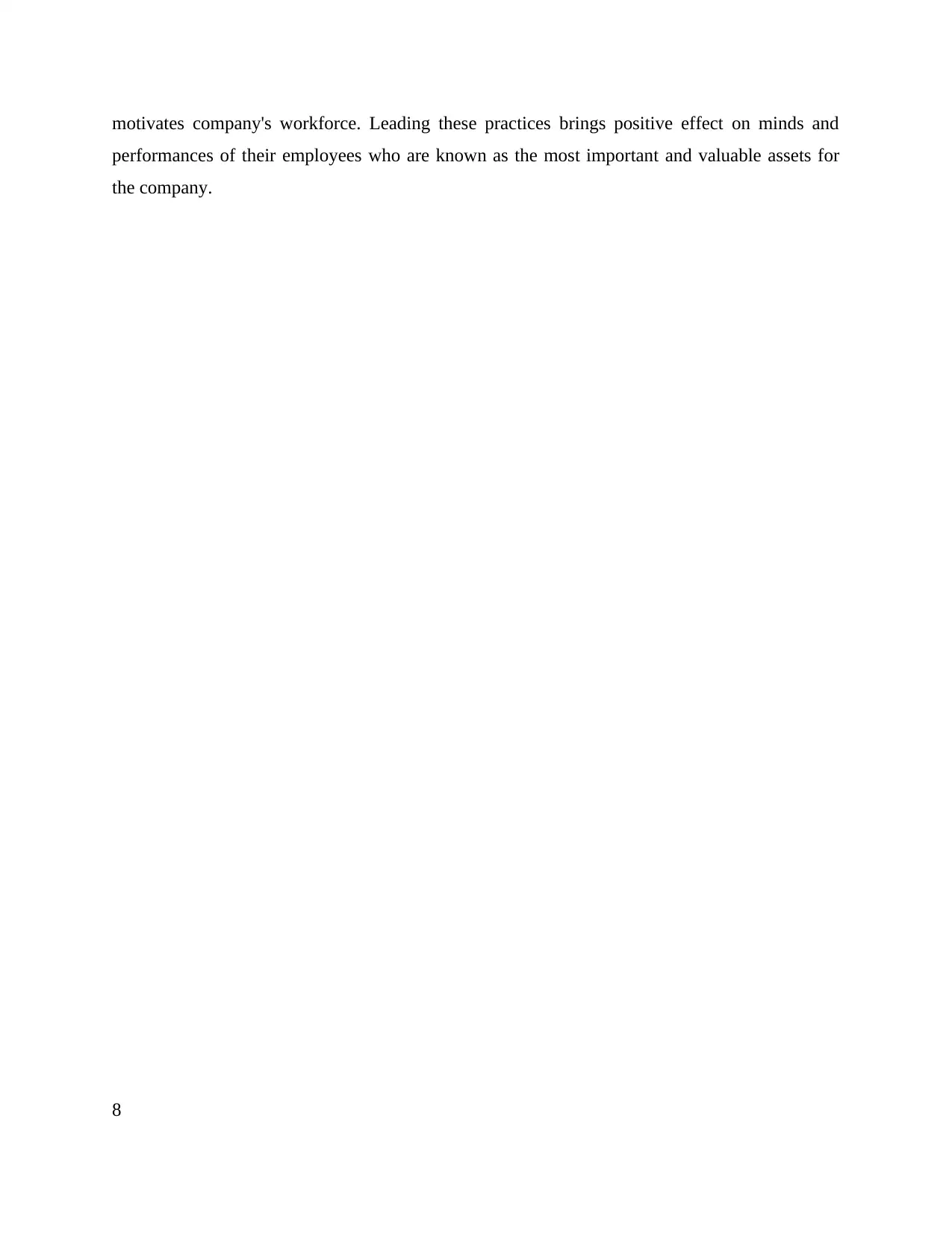
motivates company's workforce. Leading these practices brings positive effect on minds and
performances of their employees who are known as the most important and valuable assets for
the company.
8
performances of their employees who are known as the most important and valuable assets for
the company.
8
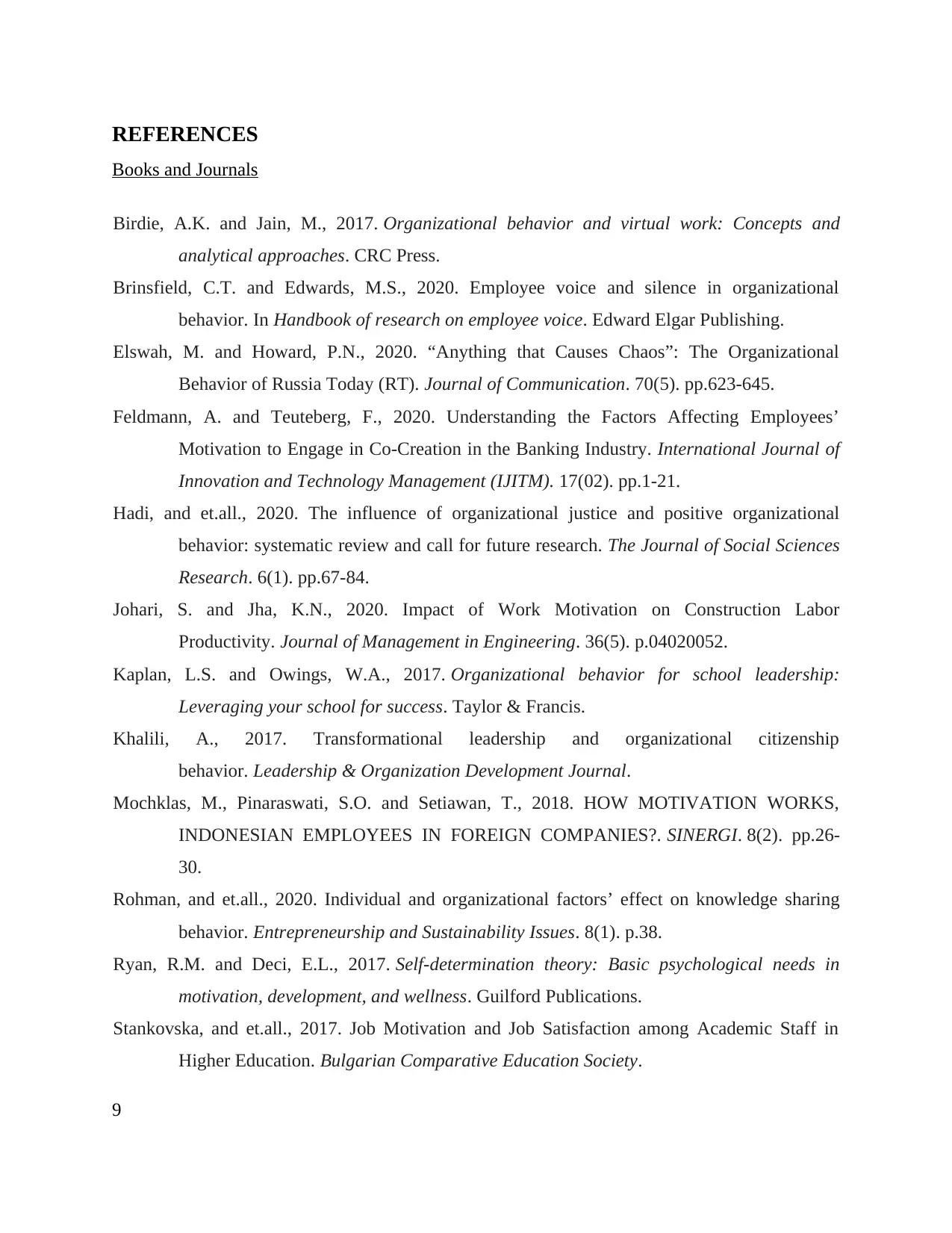
REFERENCES
Books and Journals
Birdie, A.K. and Jain, M., 2017. Organizational behavior and virtual work: Concepts and
analytical approaches. CRC Press.
Brinsfield, C.T. and Edwards, M.S., 2020. Employee voice and silence in organizational
behavior. In Handbook of research on employee voice. Edward Elgar Publishing.
Elswah, M. and Howard, P.N., 2020. “Anything that Causes Chaos”: The Organizational
Behavior of Russia Today (RT). Journal of Communication. 70(5). pp.623-645.
Feldmann, A. and Teuteberg, F., 2020. Understanding the Factors Affecting Employees’
Motivation to Engage in Co-Creation in the Banking Industry. International Journal of
Innovation and Technology Management (IJITM). 17(02). pp.1-21.
Hadi, and et.all., 2020. The influence of organizational justice and positive organizational
behavior: systematic review and call for future research. The Journal of Social Sciences
Research. 6(1). pp.67-84.
Johari, S. and Jha, K.N., 2020. Impact of Work Motivation on Construction Labor
Productivity. Journal of Management in Engineering. 36(5). p.04020052.
Kaplan, L.S. and Owings, W.A., 2017. Organizational behavior for school leadership:
Leveraging your school for success. Taylor & Francis.
Khalili, A., 2017. Transformational leadership and organizational citizenship
behavior. Leadership & Organization Development Journal.
Mochklas, M., Pinaraswati, S.O. and Setiawan, T., 2018. HOW MOTIVATION WORKS,
INDONESIAN EMPLOYEES IN FOREIGN COMPANIES?. SINERGI. 8(2). pp.26-
30.
Rohman, and et.all., 2020. Individual and organizational factors’ effect on knowledge sharing
behavior. Entrepreneurship and Sustainability Issues. 8(1). p.38.
Ryan, R.M. and Deci, E.L., 2017. Self-determination theory: Basic psychological needs in
motivation, development, and wellness. Guilford Publications.
Stankovska, and et.all., 2017. Job Motivation and Job Satisfaction among Academic Staff in
Higher Education. Bulgarian Comparative Education Society.
9
Books and Journals
Birdie, A.K. and Jain, M., 2017. Organizational behavior and virtual work: Concepts and
analytical approaches. CRC Press.
Brinsfield, C.T. and Edwards, M.S., 2020. Employee voice and silence in organizational
behavior. In Handbook of research on employee voice. Edward Elgar Publishing.
Elswah, M. and Howard, P.N., 2020. “Anything that Causes Chaos”: The Organizational
Behavior of Russia Today (RT). Journal of Communication. 70(5). pp.623-645.
Feldmann, A. and Teuteberg, F., 2020. Understanding the Factors Affecting Employees’
Motivation to Engage in Co-Creation in the Banking Industry. International Journal of
Innovation and Technology Management (IJITM). 17(02). pp.1-21.
Hadi, and et.all., 2020. The influence of organizational justice and positive organizational
behavior: systematic review and call for future research. The Journal of Social Sciences
Research. 6(1). pp.67-84.
Johari, S. and Jha, K.N., 2020. Impact of Work Motivation on Construction Labor
Productivity. Journal of Management in Engineering. 36(5). p.04020052.
Kaplan, L.S. and Owings, W.A., 2017. Organizational behavior for school leadership:
Leveraging your school for success. Taylor & Francis.
Khalili, A., 2017. Transformational leadership and organizational citizenship
behavior. Leadership & Organization Development Journal.
Mochklas, M., Pinaraswati, S.O. and Setiawan, T., 2018. HOW MOTIVATION WORKS,
INDONESIAN EMPLOYEES IN FOREIGN COMPANIES?. SINERGI. 8(2). pp.26-
30.
Rohman, and et.all., 2020. Individual and organizational factors’ effect on knowledge sharing
behavior. Entrepreneurship and Sustainability Issues. 8(1). p.38.
Ryan, R.M. and Deci, E.L., 2017. Self-determination theory: Basic psychological needs in
motivation, development, and wellness. Guilford Publications.
Stankovska, and et.all., 2017. Job Motivation and Job Satisfaction among Academic Staff in
Higher Education. Bulgarian Comparative Education Society.
9
⊘ This is a preview!⊘
Do you want full access?
Subscribe today to unlock all pages.

Trusted by 1+ million students worldwide
1 out of 9
Related Documents
Your All-in-One AI-Powered Toolkit for Academic Success.
+13062052269
info@desklib.com
Available 24*7 on WhatsApp / Email
![[object Object]](/_next/static/media/star-bottom.7253800d.svg)
Unlock your academic potential
Copyright © 2020–2026 A2Z Services. All Rights Reserved. Developed and managed by ZUCOL.





